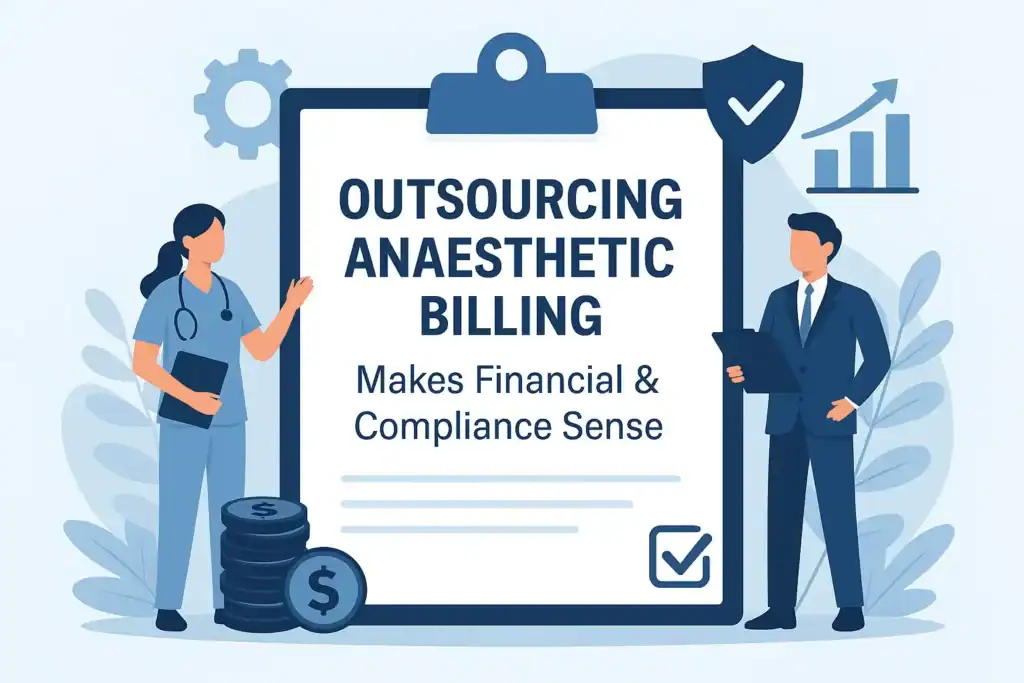Why Outsourcing Anaesthetic Billing Makes Financial & Compliance Sense
Running a busy anaesthetic practice is demanding — and billing shouldn’t be what keeps you up at night. Between compliance rules, Medicare audits, delayed payments, and coding errors, billing is more than just admin — it’s a revenue-critical function that needs expert handling. That’s why more Australian anaesthetists are outsourcing their billing to specialist services like ours.
What Does Outsourced Anaesthetic Billing Actually Involve?
Outsourcing means handing over your billing to a dedicated, experienced team who manage everything — from MBS coding and claim submissions to chasing unpaid invoices and resolving disputes. It’s like having a highly trained admin team without needing to employ one.
We handle:
- Audit-ready documentation and reporting
- Accurate and timely MBS coding
- Online and manual claim submission
- Reconciliation and tracking of payments
- Patient communications and reminders

Key Benefits of Outsourcing Anaesthetic Billing
1. Improved Cash Flow & Faster Payments
Our clients typically see a significant reduction in billing delays. With expert coding and real-time submission, your claims are processed correctly the first time — meaning faster payouts and fewer rejections.
2. More Time for Patient Care
Admin isn’t why you became an anaesthetist. Outsourcing frees up hours each week — time better spent preparing for surgery, reviewing cases, or just having a life outside of medicine.
3. Reduced Billing Errors and Rejections
Our team stays on top of the latest MBS changes and compliance rules. That means fewer rejected claims, fewer reworks, and peace of mind knowing your billing is accurate and compliant.
4. Scalable and Flexible
Whether you’re working one day a week or juggling full lists across multiple hospitals, our systems grow with you — no extra admin staff required.
5. Better Patient Experience
We handle communication with professionalism and empathy. Patients receive clear, prompt messages, easy payment options, and friendly support — reducing stress and improving goodwill.
Common Pitfalls of DIY Billing
Many anaesthetists try to manage billing themselves — or leave it with a hospital, assistant, or family member. While this might seem simple at first, it often leads to:
- Increased audit risk due to poor documentation
- Missed MBS items (and lost income)
- Delayed payments due to submission errors
- Untracked invoices and unpaid accounts
- Patient confusion or complaints
The Financial Case: How Outsourcing Saves You More
While you pay a fee for outsourcing, most anaesthetists actually earn more. Why?
- More accurate item capture = more revenue
- Fewer rejected claims = faster payments
- No need to hire or train admin staff
- Tax-deductible billing fees
- Reduced stress and better practice efficiency
It’s not a cost — it’s an investment in your financial health.
Case Studies: Success Stories of Outsourced Anesthetic Billing
The healthcare industry is replete with success stories that underscore the effectiveness of outsourced anesthetic billing. In one notable case study, a mid-sized Anaesthetic practice faced chronic revenue leaks due to coding errors and delayed submission of claims. Upon partnering with an outsourced billing service, they not only stemmed the revenue loss but also saw a 25% increase in collections within the first six months.
Choosing the Right Anesthetic Billing Partner
When selecting an anesthetic billing service provider, several essential factors must be considered to ensure a successful partnership. Verify the provider’s credentials and experience, with a particular emphasis on their track record in anesthesia billing.
Assess their technological infrastructure to determine if they offer advanced functionality and robust security.
A partner that can adapt to a practice’s evolving needs and offers flexible service options is also critical.
Finally, evaluate their customer service, communication quality, and responsiveness, as these elements are vital in maintaining a smooth billing process and quickly resolving issues.
Secure, Confidential, and Professional
At Fast Tracking Anaesthetic Billing Services, we take privacy seriously. All patient and billing data is handled using industry-grade security, encrypted transmission, and secure local data storage. You remain fully in control — with complete access to your billing at any time.
Is It Time to Outsource Your Billing?
f you’re tired of chasing payments or feeling uncertain about compliance, it might be time for a better way. At Fast Tracking Anaesthetic Billing Services, we’re not just a billing company — we’re your behind-the-scenes revenue team.
Let’s talk. We offer a free consultation — no pressure, just clarity.
FAQs
How Does Outsourcing Anaesthetic Billing Save Time for Healthcare Providers?
Outsourcing anaesthetic billing saves time for healthcare providers by eliminating the need for them to manage complex billing tasks. It frees providers from dealing with coding, claim submissions, follow-ups, and negotiations with insurance companies. This allows them to focus more on patient care rather than administrative duties.
What Are the Signs That a Practice Should Consider Outsourcing Its Anaesthesia Billing?
A practice should consider outsourcing its anaesthetic billing when there are consistent issues with claim denials, a high rate of billing errors, staff complaints of overwork due to billing complexities, or when there’s a noticeable delay in payments that hampers cash flow.
Additionally, if the practice is unable to keep up with changing regulations or lacks adequate billing technology, it may be time to outsource.